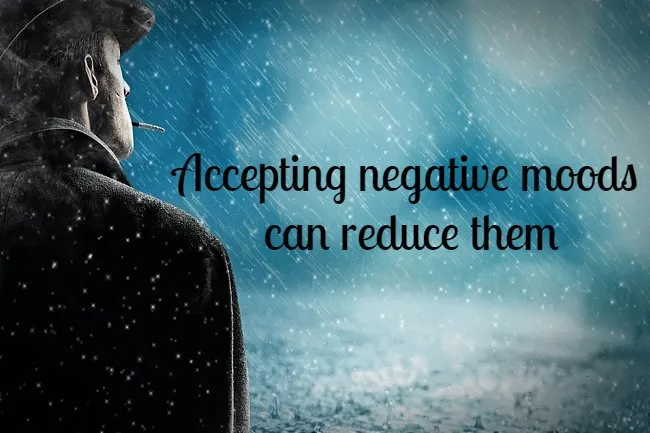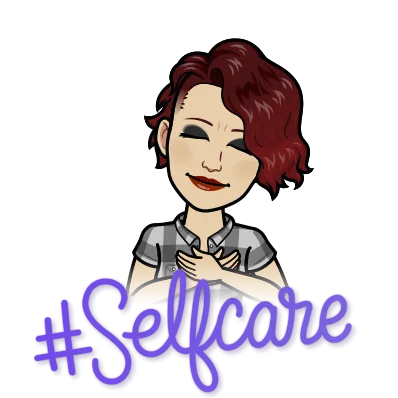To think positive is a piece of advice you must have come across pretty often. If nowhere else, you could have seen it written in most of my posts. I strongly emphasize the importance of feeling good and that Philosophy of happiness that I am explaining and writing about, has it at its core. Happiness is not about a destination and final answers, it is about the journey and on that journey life will throw at you everything that it can and not all of it will be to your liking. Is it possible then to always be happy? No, it is not and that is not even the point. The point is to strive to be happy as often as you can and in order to do that, you need to accept that you are sometimes not.
 CC0 image, Pixabay, author:pixel2013, adapted
CC0 image, Pixabay, author:pixel2013, adapted
There are many philosophies out there that will speak about living in the moment and taking a positive approach. There is nothing wrong with them but you need to be careful because they can do more damage than good if you blindly follow them without a deeper understanding of how your psyche works. Yes, you should be happy but truly happy and not fake happy. Putting on a mask with a smiley face over your mood does not work. It only barries your problems until they eventually (and they always do) come out to bite you in the ...


I will talk about how recognizing what state you are in is important but there is no way around it, you have to go straight through self-compassion to get there. The reason behind this detour is your ability to remain unjudgemental when you recognize a certain state and use your objectivity when dealing with cause and effect relations.
Relate to yourself with kindness
Self-compassion is a construct drawn from Buddhist psychology and it relates to self-love and treating yourself with kindness. The first person who operationally defined the term was psychologist Kristin Neff who described it as being gentle, supportive, and understanding to yourself. I can not emphasize enough how this is important for your psychological health. There is a huge difference between making a bad decision and considering yourself a bad person because of some bad decision. That is where self-compassion comes in because you are able to show acceptance for your "mistakes" and find ways to correct them instead of allowing them to belittle your worth as a human being. Your psychological well-being is dependent on your level of self-compassion and so are your emotional intelligence, happiness, overall life satisfaction, anxiety, depression, and healthy relationships. There is a great paper about it written at Duke University that you can read here:
Self-Compassion: Conceptualizations, Correlates, & Interventions by Laura K. Barnard and John F. Curry


The problem with having or not having a healthy personality starts with defining what personality is. There is a Five-Factor Model, the approach that has so far received the most rigorous empirical treatment, a personality consists of a set of 30 facets that form five basic dimensions. Your behaviors reflect your personality. You can remember what those 5 factors are with a mnemonic "ocean":
Openness to experience
Conscientiousness
Extraversion
Agreeableness
Neuroticism
From Freud to modern theories
From good old mother-blaming Sigmund to psychologists today, everyone had some sort of idea what a healthy personality should be defined as. Freud said it was “love and work,” Maslow believed psychological health is synonymous with "self-actualization", Rogers said that it means people are "fully functioning", and Frankl proposed that psychologically healthy people are able to find meaning in their lives. Psychologist Wiebke Bleidorn, from the University of California, gathered up a team from USA and Germany to study the matter and find the final answer. He proposed the existence of a "specific personality prototype" that has certain characteristics such as the ability to love, to hold an optimistic view of the world, to be rational, have self-awareness, be able to take responsibility, be open to creative ideas, and to be capable of doing good. This is where that "ocean" comes in. The healthy personality is high in Openness to Experience, Conscientiousness, Extraversion, and Agreeableness while it is low in Neuroticism. The research paper is available here:
The healthy personality from a basic trait perspective by Bleidorn, Wiebke Hopwood, Christopher J. Ackerman, Robert A. Witt, Edward A. Kandler, Christian Riemann, Rainer Samuel, Douglas B. Donnellan, M. Brent
Keep in mind that this does not mean (nor will it ever) that you are 100% of the time like that. A healthy personality means you are most of the times having those characteristics. There is not a psychologist in the world who will tell you that it is possible to always be in a positive mood. Striving to be happy and recognizing when you are not is a good thing. There are those who are happy more often than others but all of us get sad, angry or disappointed once in a while. It is what makes us human to recognize what we do not like and what we do like.


To occasionally feel negative is normal and it can even be cleansing but if your negative moods last for long and turn into depression then you have a problem. Negative mood is a consequence of chronic unresolved stress and it can affect your health, productivity, and relationships. The root of all this is irrational thinking about people and things you experience, overgeneralizing, and focusing on your feelings instead of the cause of the problem or its solution.
Rational and emotional you,
need to be in balance
Ignoring your emotions never works and is not productive in a long run but neither is relying exclusively on them alone. A strong balance between your rational mind and feelings is the best approach. You need to recognize and acknowledge your every emotion, feel and experience it just as you need to figure out where did it came from, what caused it, and if you want to keep it or change it and in what way. You should also keep in mind that some people perform better under pressure or when in a negative mood and their entire way of thinking changes. The results from one experiment in 2010, showed how people in positive moods prefer satisficing strategies leading to a higher number of proposed solutions while people in a negative mood choose optimizing strategies and are more concerned with the quality of their ideas. You can read about it here:
The Effects of Positive and Negative Mood on Divergent-Thinking Performance by Suzanne K. Vosburg
3 ways to optimize your mood
Up until now, there have been series of debates on whether you need a professional to help you or you can help yourself regarding some problems. I will always say that you need both and will remain a strong believer that just as you have a professional for your physical health, you should have one for your psychological too. That does not mean that you have to run to your doctor for everything. There are bandages, herbal remedies, and pain pills for your body just as there are techniques that will help your psyche.
Harvard Medical School researchers have identified three self-administered positive psychology writing exercises that help people in recovery from substance use disorders but can also be used by anyone else who wishes to help themselves turn that frown upside down. This was the first large study designed to find if self-administered, text-entry-based positive psychology writing exercises can significantly improve in-the-moment happiness. Participants completed text-entry-based written exercises and rated their degree of happiness before and after the particular writing exercise.
There were 3 techniques of positive memory specificity that were used: Reliving Happy Moments where the participants needed to select a photo of a happy memory they had and shortly describe it, Savoring where they had to describe two specific positive experiences from the past day and the Rose, Thorn, Bud technique where they needed to describe a bright spot (rose) and a challenge or an obstacle (thorn) from the preceding day, and then forecast something positive that would ‘blossom’ the following day (bud). Exercises are only 4 minutes long, easily put in the normal daily routine and significantly increase in-the-moment happiness so next time you feel that blues, give them a try. Until then, you can read the study here:
Do self-administered positive psychology exercises work in persons in recovery from problematic substance use? An online randomized survey by Bettina B. Hoeppner, Melissa R. Schick, Hannah Carlon, Susanne S. Hoeppner


A psychologist Brett Ford, at the University of Toronto, researched if the amount that people "accept" their negative emotions is associated with their better mental health and reduced negative moods over time. There were 3 studies and more than 1000 people participated.
Experiencing negative emotions
in a non-judgemental way
In their first study, they found that accepting mental experiences was related to less anxiety and depression just as it was to more life satisfaction. The effect persisted even when the other variables such as cognitive re-appraisal were accounted for. In the second study, participants were put in a laboratory and exposed to a variety of stressors. Those with a higher level of general acceptance experienced lower levels of negative mood. The third study lasted over a six month period and after assessing participants found how high levels of acceptance were associated with better mental health because positive mental health was explained by reduced levels of negative emotions six months later. You can read those studies here:
The Psychological Health Benefits of Accepting Negative Emotions and Thoughts: Laboratory, Diary, and Longitudinal Evidence by Brett Q. Ford, Phoebe Lam, Oliver P. John, Iris B. Mauss
When you take everything that you have read in this post, into account, what is your conclusion? Did you get the point that I was trying to make? In order to be happy, you need to accept that you are sometimes not and there is nothing wrong with that. Do not be angry at your self because you are angry and do not feel sad because you are sad. That is a vicious circle that is hard to break free from. Use your ability of self-compassion and accept the state you are in. Without accepting it, there is no moving forward. How would you know where to go if you do not know where you are? When you accept it and allow yourself to feel it without judgment, then you can work on ways to getting better. If you want to reduce your negative moods, accept them. Do not accept them as a permanent state but work on them and know that it is sometimes ok not to be ok. What matters is that you do not stay that way so give yourself some love and kindness whenever you feel blue.
If you are interested in learning more on this subject, check out these REFERENCES:

Until next time,
KEEP YOUR SMILE ON!



Image sources AND LICENCES in order of appearance:
- all images used in this post are free for commercial use, they are royalty free with the links to original images provided under them
- titles are made with the CC0 image from Pixabay that can be found here
- line divider that I use is from FREE CLIPART LIBRARY, and is here
- my bitmoji avatar was created on https://www.bitmoji.com/, visit the site to create yourown
PROUD MEMBER OF:





 CC0 image, Pixabay, author:pixel2013, adapted
CC0 image, Pixabay, author:pixel2013, adapted




















